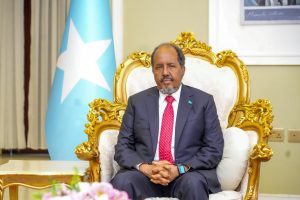Somalia’s Hassan Sheikh Raises Climate Alarm in Addis Ababa: Between Diplomatic Calls, Business Realities and Humanitarian Stakes
At the Second Africa Climate Summit (ACS2) in Addis Ababa, Somali President Hassan Sheikh Mohamud delivered a pointed reminder of the global climate paradox: countries contributing the least to greenhouse gas emissions are often those paying the heaviest price. Declaring Somalia’s contribution “insignificant,” he underscored how the Horn of Africa nation remains among the most vulnerable to climate shocks.
The president’s remarks highlight a broader diplomatic tension at international climate negotiations. Nations like Somalia face the double burden of being climate victims without wielding significant influence in decision-making forums. For Mogadishu, Addis Ababa provided a rare platform to push for climate justice and financing mechanisms tailored to fragile states.

Somalia’s position aligns with other African states calling for fairer global climate governance, where developed nations, historically responsible for higher emissions, commit more decisively to climate finance, adaptation funds and debt relief. Diplomats note that Hassan Sheikh’s words resonate beyond Somalia: they reflect the frustrations of many low-emission African states grappling with droughts, floods, displacement, etc., while waiting for pledged funds that are often delayed or insufficient.
Somalia’s economy, which still recovering from decades of conflict, rests heavily on climate-sensitive sectors such as livestock, agriculture and fisheries. Severe droughts in recent years have decimated herds, shrunk household incomes, weakened trade and so on. Businesses, particularly in food distribution and small-scale manufacturing, are squeezed between supply disruptions and rising costs.
Climate instability also complicates foreign investment. International companies are hesitant to commit capital where environmental risks intensify uncertainty. Local entrepreneurs, meanwhile, struggle to insure their businesses, as Somalia lacks robust financial instruments to absorb climate shocks. Hassan Sheikh’s appeal in Addis Ababa therefore carries an implicit business argument: securing climate adaptation financing is not only humanitarian, it is an economic lifeline.
The humanitarian stakes are stark. According to aid agencies, more than six million Somalis face food insecurity linked directly to drought and erratic rainfall. Flash floods earlier this year displaced thousands, often in communities already reeling from water scarcity. Climate change has also accelerated urban migration, straining fragile social services in Mogadishu and other towns.
Women and children bear the heaviest burdens, often walking long distances to fetch water or facing heightened risks of malnutrition. Humanitarian actors believe that climate change is not an abstract future, because the situation is a defining context of daily operations in Somalia.
President Hassan Sheikh’s intervention also ties climate change to Somalia’s broader political and security landscape. Drought and resource scarcity exacerbate clan tensions, undermine pastoral livelihoods and create openings for extremist groups like Al-Shabaab to exploit grievances. Climate stress in this sense, feeds directly into conflict dynamics.
By raising the issue at ACS2, the president signaled that climate security must be understood as part of Somalia’s national stabilization agenda. Policymakers argue that any sustainable peace-building framework must integrate climate adaptation, from strengthening water management to building resilient rural economies.
At a social level, climate change is reshaping how Somalis view government legitimacy. Communities often judge leaders by their ability to respond to droughts, floods and food shortages. Hassan Sheikh’s public climate diplomacy may bolster domestic credibility if it translates into tangible relief. Conversely, unfulfilled promises from global partners risk deepening disillusionment at home, where citizens already feel abandoned by both state and international actors.
The Addis Ababa summit offered African leaders a stage to coordinate positions ahead of global climate talks later this year. In respect to Somalia, Hassan Sheikh’s remarks serve as a reminder that Africa’s climate struggle is not uniform: some states seek energy transition financing, while others like Somalia, fight for sheer survival.
As the international community debates pathways to net zero, Somalia’s plea raises uncomfortable but necessary questions. How can the world justify leaving behind countries that contributed almost nothing to the crisis? And can global climate finance be redesigned to reach fragile and conflict-affected states more effectively?
For now, Hassan Sheikh’s statement is both a diplomatic plea and a political warning. Without urgent and equitable climate action, Somalia’s climate vulnerability will remain not just an environmental issue, but a destabilizing force for the entire Horn of Africa.






